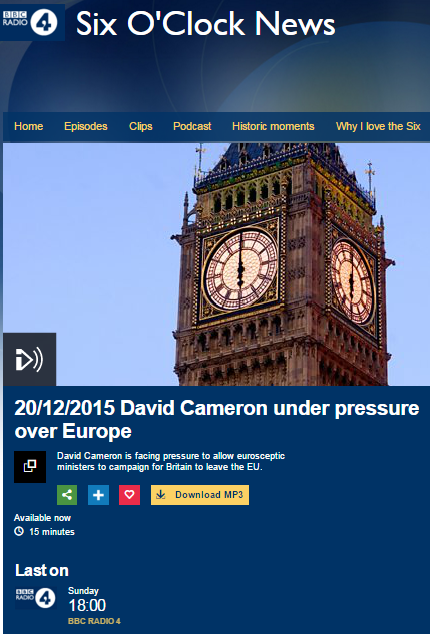Readers may recall that a BBC Radio 4 News bulletin from December 20th 2015 misled listeners with regard to the fact that Samir Kuntar’s role in the 1979 terror attack in Nahariya was proven in a court of law.
“A leading figure in the Lebanese militant group Hizballah has been killed by a rocket attack in the Syrian capital Damascus. Samir Kuntar had previously spent thirty years in an Israeli prison for his alleged role in the killing of four people. Hizballah said Israel was behind the rocket attack. An Israeli minister welcomed his death but didn’t say whether his country had carried it out.” [emphasis added]
A member of the public who immediately alerted the BBC to the use of that inaccurate and misleading wording received (over two weeks later) one of BBC Complaints’ infamous template responses – which completely failed to address the issue raised.
“Thank you for contacting us about the recent escalation in violence in Israel, the West Bank and Gaza. We have received a wide range of feedback about our coverage of this subject across our television and radio programmes, and the BBC News website. In order to use our TV licence fee resources efficiently, this response aims to answer the key concerns raised in complaints received by us, but we apologise in advance if it doesn’t address your specific points in the manner you would prefer.
We appreciate you believe our coverage of this story has shown bias in favour of the Palestinians and against Israelis and the state of Israel. In this response we hope to explain why we feel this has not been the case.
Across our news bulletins and programmes we have reported on the increasing number of attacks committed by Palestinians on Israeli civilians and security forces. We have broadcast reports where our reporters have spoken to the families of Israelis and Palestinians killed in the recent violence and have heard their respective stories and own specific takes on the conflict.
For example, during BBC One’s News at Ten on 9 October we heard from Odel Bennet. She and her husband were attacked by a Palestinian in the Old City the previous weekend. She was seriously injured; her husband and a rabbi who intervened were both killed. During the report we showed amateur video footage of the attack. We then heard from Mrs Bennet who, from her hospital bed, spoke of her fear and pain, and described how Palestinian passers-by mocked and verbally abused her while she lay wounded on the street.
We have tried to explain how the current situation has come to pass from the Israeli and Palestinian perspectives. This has included reporting on the tensions around the holy sites in Jerusalem. We have also reported on criticisms of the Palestinian leadership’s response to the attacks, in particular the Israeli government’s claim that President Abbas and the Palestinian Authority are guilty of inciting violence in the West Bank. We believe we have reported clearly on the threat of violence faced by Israelis on an increasingly regular basis and of the difficulties faced by security forces in stopping these attacks from taking place.
BBC News tries to report on the Israeli-Palestinian conflict in an accurate and duly impartial manner. Sometimes this means we can’t always reflect the full extent of the complexities of the conflict during one standalone report or bulletin. We try to tell the story of the conflict as experienced by both sides, across programmes and bulletins and over time. We believe this has been the case during our coverage of this recent spike in violence.
We have raised your concerns with senior editorial staff at BBC News, who consider the range of feedback received from our audience when deciding how they approach reporting on stories.”
The receipt of such an irrelevant response naturally raises the question of whether staff at the BBC Complaints department even bothered to read the complaint to which they were ostensibly replying.
Such template responses have of course long been employed by the BBC Complaints department and their primary purpose is obviously to tick a box and reduce the department’s workload. This particular member of the BBC’s funding public did not however give up in the face of an extraneous response and the complaint was resubmitted at the next stage.
The subsequent reply – received over five weeks after the original broadcast – read as follows:
“Thanks for getting back in touch. Apologies for the delay in replying. We do very much regret that we’ve not been able to get back to you as quickly as we, and you, would have liked.
Apologies also for our previous response not addressing your concerns.
We raised your complaint with senior editorial staff at radio newsroom. They appreciate your point and accept the script should have been written more clearly. It would have been better, for example, if this bulletin mirrored Radio 4’s 0900 bulletin’s on the same date (20 December), to remove any possible ambiguity about the nature of the conviction against Samir Qantar:
“The Lebanese militant group Hezbollah say a leader of the group has been killed by an Israeli airstrike in the Syrian capital, Damascus. Samir Qantar was sentenced to life in prison in Israel in 1979 for an attack in Israel that killed four people but was released seven years ago as part of a prisoner swap. An Israeli minister welcomed his death but did not comment on who was responsible.”
Thanks for taking the time to contact us, we hope this goes some way in addressing your concerns.”
So, whilst BBC staff “accept the script should have been written more clearly” they apparently have no intention of actually doing anything to correct the misleading and inaccurate impression given to Radio 4’s listeners.
Once again, this case raises questions concerning the BBC’s accountability and its commitment to correcting its own mistakes in a consistent manner which serves the public interest. All the BBC had to do was to read this complaint properly and broadcast a correction in the next edition of that news programme. Instead, it wasted publicly provided resources by unnecessarily dragging out a very simple issue over a period of nearly a month and a half.
It is interesting to compare the BBC’s decidedly complacent approach to complaints and corrections to that of the US broadcaster NPR – as recently laid out in a CNN interview with NPR’s Head of News, Michael Oreskes.
“We don’t make silent corrections to our stories. We make corrections to help keep the public accurately informed – not to absolve ourselves of our mistakes.”
“So when you make an error of fact you have to correct it right away and you have to say you’ve corrected it.”
Keeping the public accurately informed is supposedly the mission of the BBC too but when members of the public alerting the corporation to inaccuracies and errors are shrugged off with tardy, irrelevant replies and forced to spend weeks navigating the labyrinthine complaints system in order to squeeze out a response which does nothing to repair the damage done by the error, it is very difficult to believe that mission is really at the peak of the BBC’s priorities.
Related Articles:



